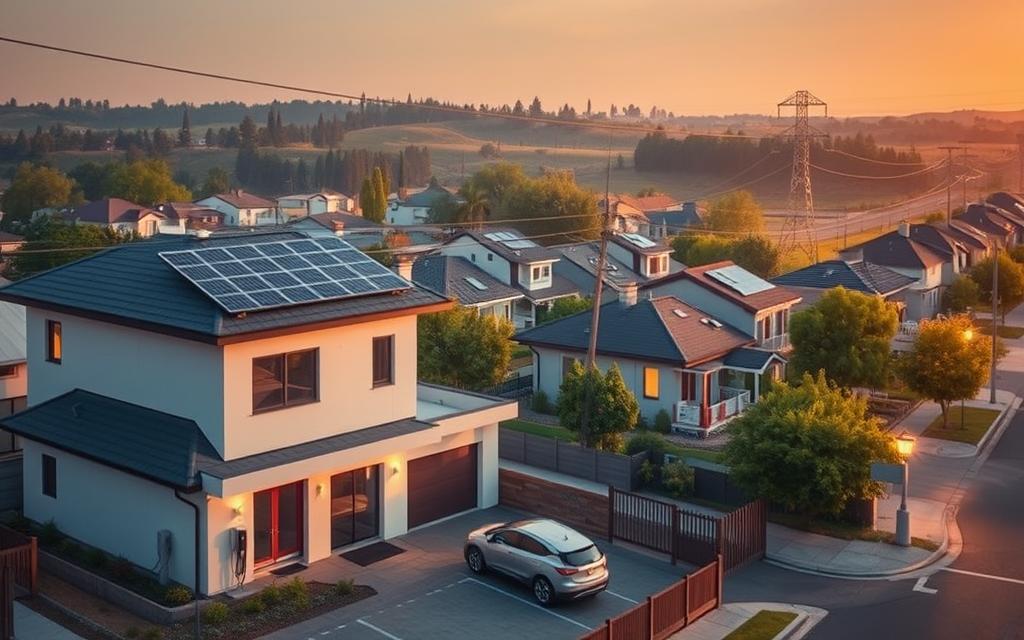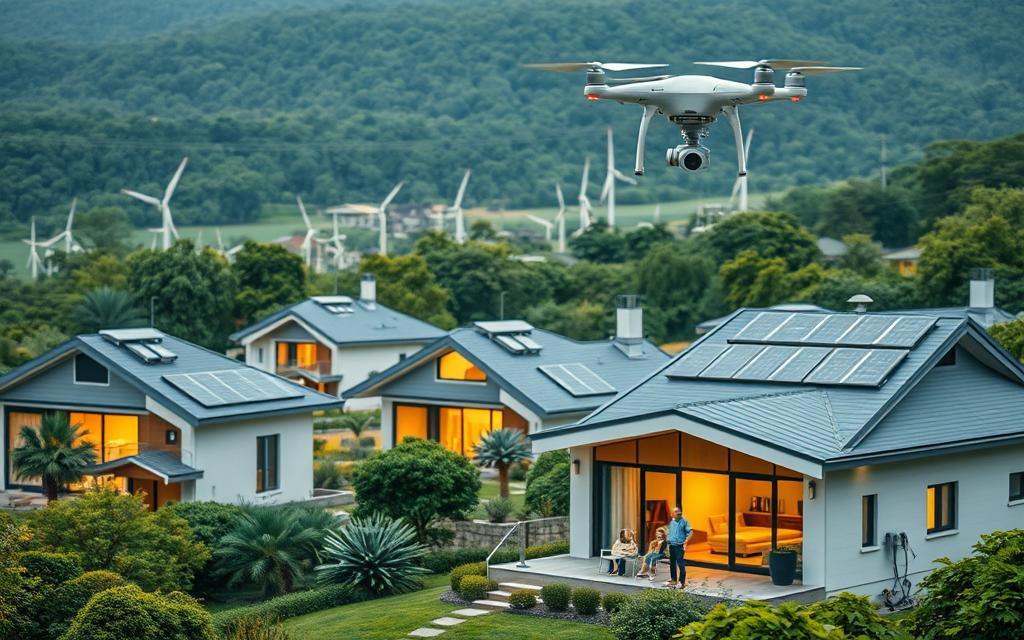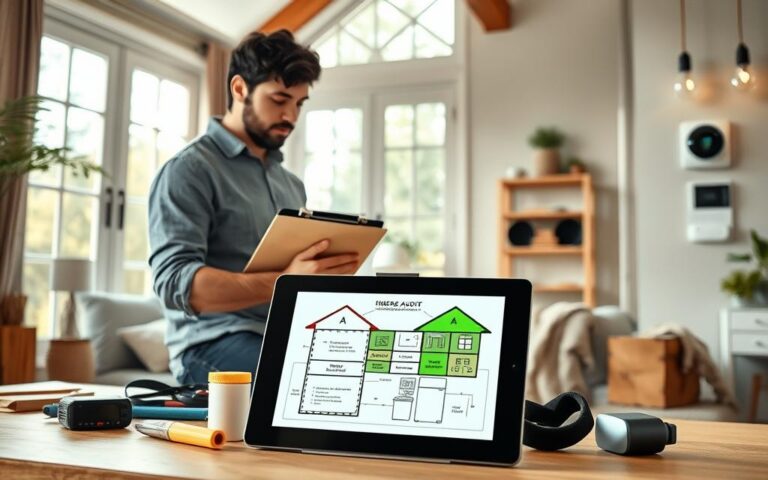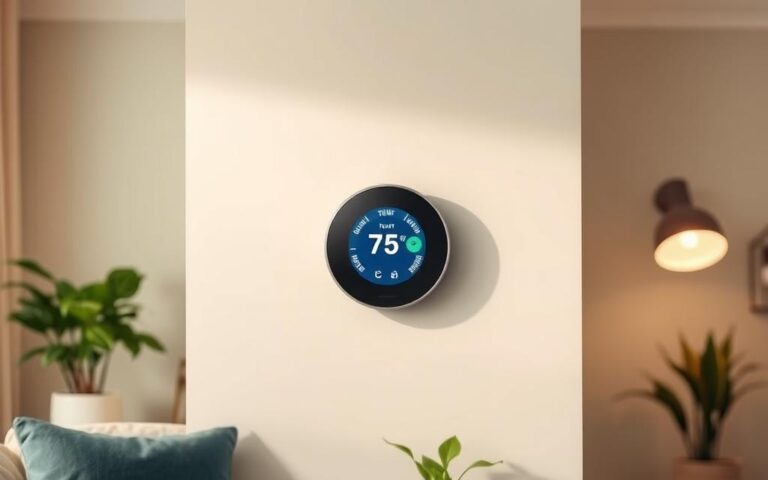Did you know that by 2030, 70% of U.S. homes will have smart grid technology? This shows a big change towards smart homes and green living. Smart grids use advanced tech to manage energy better. They help use solar and wind power easily in our homes.
Using smart grid tech can make homes more energy-efficient and green. This leads to big savings on electricity bills. As we explore smart grid homes, it’s clear they’re key for a better, greener future.
What is a Smart Grid Home?
A smart grid home uses the latest technology to better manage energy and cut down on electricity use. It has parts that work together to let homeowners control their energy use better. These include advanced energy systems, smart appliances, and strong networks that connect homes to utility providers.
Definition and Key Components
At its heart, a smart grid home analyzes energy use in real-time. Smart meters give instant feedback on how much energy is being used. Automated controls adjust energy use based on demand patterns.
Together, these parts give homeowners a clear view of their energy use. This lets them make choices that save energy.
How It Differs From Traditional Systems
Smart grid homes are very different from old energy systems. Old systems only send information one way and manage energy reactively. Smart grid homes, on the other hand, have a two-way flow of information.
This proactive approach makes the grid more reliable. It helps respond quickly to outages and high demand. Unlike old systems, smart grid homes lead to a more efficient and reliable energy network.
Benefits of Smart Grid Homes
Smart grid homes offer many advantages. They change how we use and manage energy at home. These benefits include saving money, using energy better, and helping the environment.
Energy Efficiency Improvements
Using energy-efficient tech is key in smart homes. Homeowners learn how to use energy better with help from smart systems. This leads to less waste and more use of green energy.
Homes become more efficient. This makes living more sustainable.
Cost Savings for Homeowners
Smart grid tech helps homeowners save money. Bills can drop by 10% to 20%. This is because homes use energy better during busy times.
Homeowners also get lower rates and a steady energy supply. This is thanks to better grid reliability.
Environmental Impact and Sustainability
Smart grid systems are good for the planet. They help use renewable energy more. This reduces carbon emissions and supports a cleaner future.
By using these technologies, homeowners help the environment. They support sustainable living and protect our planet.
How Smart Grids Work
Smart grids work by combining renewable energy, device communication, and real-time data. These elements boost efficiency and make homes more sustainable. They turn smart grid homes into resilient and green spaces.
Integration of Renewable Energy Sources
Smart grids help homes use clean energy like solar panels and wind turbines. This way, homes use less fossil fuel and cut down on carbon emissions. Homeowners can track their energy use and make the most of their clean energy investments.
Communication Between Devices
Communication is key in smart grid technology. In smart homes, devices talk to energy systems smoothly. This leads to better energy use and lower bills. Good communication is crucial for smart grids to work well.
Real-Time Data Monitoring
Real-time data is vital for smart grids. Homeowners get updates on their energy use through smart meters. This info helps them use energy wisely and live more sustainably.
The Role of Smart Meters
Smart meters are a big step forward in energy tracking for smart grid homes. They’ve replaced old analog meters. These digital devices give detailed, real-time info on how much electricity you use. They also let homeowners and utility companies talk to each other.
How Smart Meters Function
Smart meters use cutting-edge tech to work. They keep an eye on how much energy you use and send this info to your utility company. This lets you see how much energy you’re using. It also means you can change your energy use based on the price.
Benefits of Smart Metering for Homeowners
Smart meters bring many benefits. They help you save money by managing your energy better. You can see how much energy you use and change your habits to save money. Other perks include:
- Lower utility costs thanks to real-time pricing
- Better tracking of your power use
- Help in making smart choices about energy use
Adding smart meters to your home makes it more energy-efficient. It also helps you save money.
Securing Smart Grid Homes
Smart grids use digital tech, facing many cybersecurity challenges. It’s key to protect sensitive data and critical systems from cyber threats. Hacking or unauthorized access can harm energy management systems, affecting safety and efficiency.
Knowing the risks and keeping a close eye on systems can help. This way, we can keep residential energy systems safe.
Cybersecurity Challenges
Smart grid homes get many benefits from advanced tech. But, they also face big cybersecurity risks. Threats include data breaches, identity theft, and even physical safety risks from hacked devices.
As we use energy management systems, understanding these risks is crucial. Cybersecurity must keep up with the growing threat of cyber attacks on smart grid systems.
Best Practices for Protection
Protecting smart grid homes from cyber threats is essential. Homeowners should follow these steps:
- Use strong, unique passwords for all smart devices and change them often.
- Keep software and firmware updated to avoid known vulnerabilities.
- Use firewall protection to control incoming and outgoing traffic.
- Work with cybersecurity experts for custom security plans and checks.
By following these tips, homeowners can boost their cybersecurity. This helps protect their smart grid systems and sensitive data.
Smart Appliances and Their Importance
Smart appliances make modern homes more efficient and functional. They include smart thermostats, lighting systems, and advanced appliances like washing machines and refrigerators. These devices help manage energy use, making homes part of the smart grid.
Types of Smart Appliances
- Smart Thermostats: Devices like the Nest Learning Thermostat adjust home temperatures based on user habits.
- Smart Lighting Systems: Brands like Philips Hue let users control lights remotely, saving energy.
- Smart Refrigerators: Samsung’s smart fridges alert users about food levels and cool more efficiently.
- Smart Washing Machines: LG’s Smart Wi-Fi Washer lets users start and check laundry from their phones.
How They Contribute to Efficiency
Smart appliances use energy wisely and save homeowners money. They adjust their use based on energy prices and usage. For example, a smart thermostat can cool or heat your home less during peak times.
These appliances work well with the smart grid. They use advanced systems to adjust to energy supply and demand changes. This smart management helps homeowners save money, making these appliances key to energy efficiency.
| Type of Appliance | Main Benefits | Impact on Energy Use |
|---|---|---|
| Smart Thermostat | Adjusts temperature automatically | Reduces heating/cooling costs by up to 15% |
| Smart Lighting System | Remote control and automation | Can cut lighting costs by 30% |
| Smart Refrigerator | Inventory management features | Minimizes food spoilage and energy waste |
| Smart Washing Machine | Remote operation and scheduling | Saves up to 10% on water and energy |
Utility Companies and Smart Grids
Utility companies play a key role in making homes smarter. They help set up systems that save energy and support green living.
Role of Utilities in Smart Home Integration
These companies lay the groundwork for smart homes. They install smart meters and energy-saving systems. Working with homeowners, they help make energy use better.
Incentives for Homeowners
Utility companies give homeowners great reasons to go smart. They offer rebates and help with the cost of smart appliances. This makes homes more energy-efficient and helps the planet.
| Utility Company | Available Incentives | Potential Savings |
|---|---|---|
| PGE | Rebate for smart thermostats | Up to $100 |
| Florida Power & Light | Smart appliance rebates | Up to $200 |
| SCE | Home energy assessments | Varies, potentially over $500 |
Home Automation and Smart Grids
Home automation systems are key to making smart grid homes more efficient. They connect various smart devices, helping homeowners manage their energy better. This includes smart lighting and advanced heating controls, all working together to save energy.
Integrating Smart Home Technology
Smart home technology makes controlling and managing energy easier in smart grid homes. Homeowners can set their appliances to run when energy is cheaper. This not only saves money but also helps the environment.
Applications for Daily Life
Smart grid technology makes daily life more convenient. For example, smart thermostats adjust the temperature based on who’s home. This saves energy and keeps homes comfortable. Homeowners also get to see how much energy they use, helping them make better choices.
Challenges in Adopting Smart Grids
Smart grid homes are becoming more popular, but there are challenges to overcome for wider adoption. Knowing these obstacles helps homeowners make better choices when switching to these systems.
Initial Costs and Investments
Upgrading to smart grid technology can be expensive. Homeowners face high costs for smart meters, energy-saving devices, and other needed equipment. While these upgrades save money in the long run, the initial cost is a big hurdle for many.
Public Awareness and Education
It’s important to raise awareness about smart grid homes. Many people don’t know how these systems work or their benefits. By teaching about smart grids and their role in saving energy, we can build trust and encourage more homeowners to adopt them.

Future Trends in Smart Grid Technology
As energy use changes, future trends in smart grid tech will change how we manage home energy. New innovations will make smart grid homes work better. These include better IoT devices, energy storage, and data analysis.
Innovations on the Horizon
New tech will make IoT devices work better together in smart homes. This means smart appliances will use energy more efficiently. Also, homes will store energy from solar and wind better, making energy systems stronger.
The Impact of AI and Machine Learning
AI and machine learning will change how we manage smart homes. They will analyze lots of data to predict energy use. This lets systems adjust energy use in real time, making homes more efficient and stable.
| Technology | Potential Impact on Smart Grid Homes |
|---|---|
| IoT Devices | Enhances connectivity and automation of energy usage |
| Energy Storage Solutions | Enables efficient management of renewable energy |
| Data Analytics | Provides insights for predictive energy management |
| AI Algorithms | Facilitates real-time adjustments for energy efficiency |
Getting Started with Smart Grid Homes
Homeowners looking to use smart grid technologies should first check their energy use. Finding ways to use less energy is key. They should get smart meters, energy-saving appliances, and smart home systems.
Working with utility companies can also help. They offer incentives and support to make the switch easier. This support helps homeowners move towards using energy more wisely.
There are many resources to help with this change. Utility companies provide guides and help programs. Local groups also offer workshops and sessions on smart grid benefits and how to use them.



